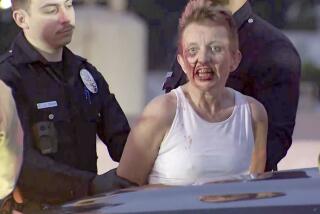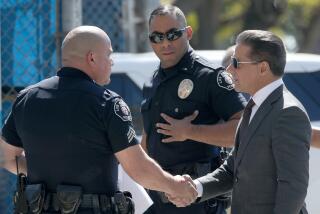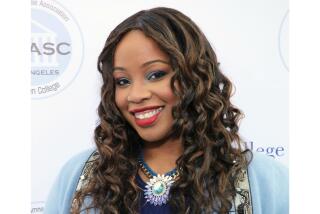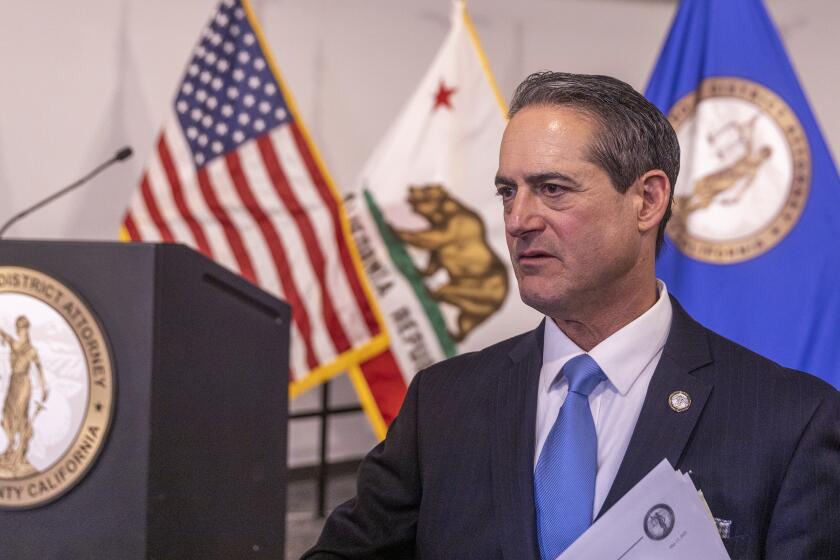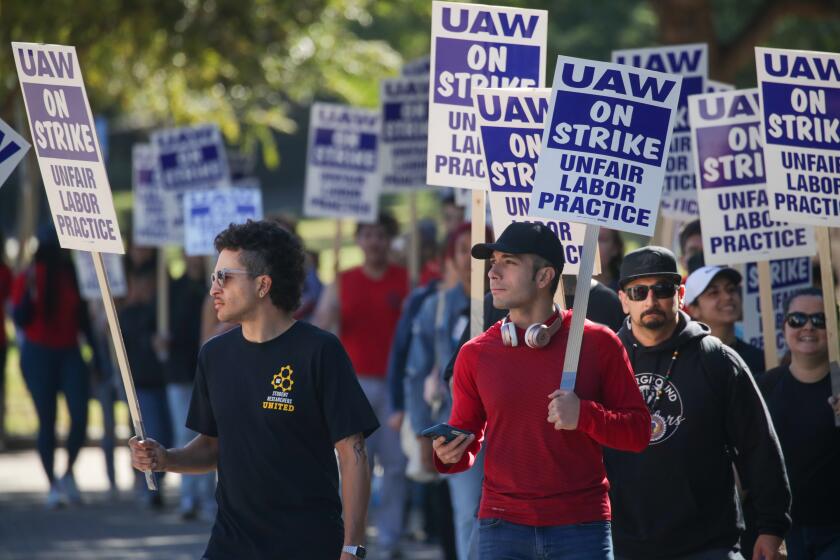O.C. High Schools Prove Fertile Ground for Christian Clubs
The largest club at Newport Harbor High School gathers in a darkened classroom every Thursday at lunch. Teenagers listen to guest pastors lecture on the Gospel and how it relates to high school. While some students play guitars, others lift their voices in songs celebrating Jesus.
Mostly, they pray: for their school and their teachers, for each other’s families, and for friends who haven’t found the way, who continue to spend weekends hanging out at keg parties.
For the record:
12:00 a.m. March 7, 2001 Los Angeles Times Wednesday March 7, 2001 Orange County Edition Part A Part A Page 3 Metro Desk 2 inches; 48 words Type of Material: Correction
Christian clubs -- A March 5 story on Christian clubs incorrectly reported the stipend paid to a high school boy who works to convert fellow students. The correct amount is $100 per month. In addition, a headline misstated the boy’s motivation for his endeavors. He had previously done the work without pay and it was the church’s idea to pay him.
While religious clubs still are being challenged in the courts across the nation--locally, an appellate court last week reinstated a lawsuit that would end Saddleback Valley Unified School District’s ban on them--Christian groups are flourishing at many Orange County high schools, whether officially sanctioned or not.
Outside the South, Orange County may be the epicenter of a growing national phenomenon of religious groups on high school campuses, said Brad Dachus, an attorney with the Sacramento-based Pacific Justice Institute, which is backing the lawsuit against Saddleback Valley Unified.
“It makes school and church one thing,” said Brieana Johnson, a senior at Newport Harbor High School and a co-president of the Christian club. “We don’t have to go to church outside of school. Church is right there at school.”
The strong presence of Christian clubs in Orange County has, not surprisingly, emerged in an area rich with conservative Christians and nationally known churches and fundamentalist causes, including the Rev. Robert H. Schuller’s Crystal Cathedral and the Trinity Broadcast Network.
Because the county also has long venerated athletics, it is only natural that the two have converged. In some cases, coaches are being enlisted to try to attract popular students in the effort to make Christianity “cool.”
The Fellowship of Christian Athletes, the club in question in the Saddleback case, had six chapters in Orange County in 1998. Now, under the leadership of former New York Jets football star Mark Boyer, it has about 30.
“These clubs become the cool thing to be part of,” said Boyer, an Edison High School graduate who returned to Huntington Beach to start FCA chapters after retiring from football. So many of his former teammates in the NFL found Christ with the help of the organization, he said, that he decided to devote himself to starting the clubs in Orange County.
“Athletes have a great influence on other people,” he said. “We try to get these kids to use that influence in a positive way.”
Students say it’s working.
“It’s the cool clique on campus,” said Kristin Lamont, 17, a soccer player at Capistrano Valley High School in southern Orange County and a leader in the school’s FCA chapter.
Because the Capistrano Unified School District, like Saddleback Valley, does not allow extracurricular clubs, the FCA chapter meets off campus. But Lamont said it’s influence still permeates student life.
“People come to FCA because they want to hang out with the popular people,” she said. “Talking to students who used to go to Capo, they say it used to be dorky to be a Christian. FCA has made it easy to show your beliefs and be accepted for your beliefs.”
Still, some legal experts and school officials question FCA’s methods, primarily the use of coaches to recruit students to start chapters.
“I think that’s a violation of the Equal Access Act,” said Robert Boston, spokesman for Americans United for the Separation of Church and State. “The act was designed to give students . . . a right to share their religious views. It was not meant to be a vehicle for adults to come in and use the school as a mission field.”
The 1984 Equal Access Act said schools must permit religious clubs if they permit other clubs not directly related to academic courses. The U.S. Supreme Court upheld that law in 1990.
Many school districts continue to grapple with its application.
“I personally am for very strong separation of church and state,” said Kenneth A. Kegel, a board member in the Brea Olinda Unified School District. “But if you allow the Japanese Animation club, then you need to allow these other ones.”
In order to better understand the place of religion on campus, Kegel said he attended a conference held at the Orange County Department of Education last fall to teach educators about how to allow religious expression while still respecting laws separating church and state.
Some Schools Ban All Extracurricular Clubs
On many campuses, administrators deal with religious clubs--or the equally controversial gay and lesbian clubs--by banning all extracurricular groups.
On those campuses, religious students band together into “equal access groups.” Though they are ineligible to receive funding, the students do have a right to meet at lunch and can buy space in their yearbooks for pictures.
But James A. Fleming, superintendent of Capistrano Unified, draws the line at adult organizers. He said he doesn’t permit coaches to approach students about forming religious organizations. He also noted that his district took a lawsuit all the way to the U.S. Supreme Court after a high school biology teacher sued the district for being made to teach evolution.
“Adults should not impose their views, be they political, religious or otherwise, on students in the public schools,” he said.
Fleming said he has no evidence that the FCA chapters in his district were formed after coaches approached students.
Boyer, however, said the organization sometimes starts campus groups by working with Christian coaches who approach students and help them form chapters.
“What we’ll do is find a coach,” Boyer said. “Then the coach will find the leaders, and then we meet with the leaders and they kind of run with it.”
For legal reasons, Boyer said, the coaches cannot be involved in the groups, which must be student-run, according to the Equal Access Act.
“Capo started off with a freshman basketball coach,” he said. “We had some relationship with him, and he said, . . . ‘I’ll find a couple of kids who might be interested in getting this going.’ ”
Now the group has upward of 150 members. Students have turned away from what Boyer calls “the emptiness” of the high school party scene. Instead, they travel to Mexico and volunteer at orphanages.
The group became so popular that students at other South County schools decided they wanted FCA chapters too, Boyer said.
Though school officials are not allowed to encourage students to become involved in religious activities, students are free to do so.
At Fountain Valley High School, Christian club president Adam Feichtmann said his group has converted about 20 students to Christianity over the last four years.
“We’re based on evangelism on the campus,” he said. “We reach out to other students. . . . You have to gain their personal trust and their friendship, before you want to put your religion on them.”
The Huntington Beach Union High School District permits only curricular clubs. That policy was drafted some years ago to prevent students from forming a gay and lesbian club, school board member Michael Simons said. Nevertheless, many of the district’s high schools have active Christian organizations that meet during lunch.
Fountain Valley’s group meets twice a week in biology teacher Les Armstrong’s classroom. Armstrong has been advising Christian clubs on and off for more than 25 years. He remembers when parents used to protest the clubs, but now they are accepted, he said.
Converting Peers for Spending Money
“It’s one of the greatest gifts I could personally feel,” 17-year-old Adam said of the time he sat across a biology lab table as a classmate told him she had accepted Jesus Christ as her personal savior after reading some tracts he had given her.
Adam said he joined the Christian club his freshman year because he liked the idea of helping make the school “a more Christian place.”
This year, he said he earns spending money--for movies, snacks and gas for his car--from the national organization Youth For Christ for his efforts to convert other students on campus.
Charlotte Feichtmann said her son receives a stipend--about $100 a week--for his campus ministry. It’s more fulfilling than working at a fast-food restaurant, she said. Youth For Christ also provides the teenager the leaflets he passes out to classmates.
At Newport Harbor High School, Brieana, the Christian club co-president, said the focus is not so much on converting students as on creating a community for other Christians, a refuge from the intense pressure to drink beer and have sex that she says so permeates much of campus life.
The club began five years ago, after students asked Ed Snedeker, youth pastor at St. Andrew’s Presbyterian Church, to help them organize.
“The role is to bring Christians on campus together,” Snedeker said. “Another role is to share that faith with other students.”
Before joining the Christian club, Brieana said she was living two lives--she was active in youth group but also attended high school parties, where beer and sex abounded.
About two years ago, she said she decided “I’m a Christian, and I need to take a stand at my school.”
Her mother, Janice Zorn, heartily approves.
“It’s definitely good for my daughter,” Zorn said. “It keeps them out of trouble, and they learn about organization. . . . And there’s an unspoken rule that they’re not going to party and drink.”
Sometimes, Brieana said, her involvement in the club has meant giving up friends with whom she used to go to parties. But others accept her, so much so that she was nominated for homecoming queen last fall.
“I’ve been lucky enough to have school friends that have mostly accepted it,” she said. “I’m not as close to them as I used to be. . . . But I realize I’ve found better ones through the club.”
More to Read
Start your day right
Sign up for Essential California for news, features and recommendations from the L.A. Times and beyond in your inbox six days a week.
You may occasionally receive promotional content from the Los Angeles Times.
